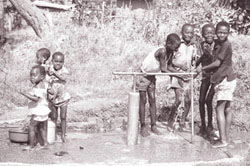
Time to wake up
The demand for water and energy is likely to increase at a geometrical rate in the coming years. What are the policy options for a better management of these resources?

The demand for water and energy is likely to increase at a geometrical rate in the coming years. What are the policy options for a better management of these resources?
FINANCE Minister Manmohan Singh has presented a budget that seeks to push the economy from stabilisation to growth, through structural adjustments. In order to give a boost to exporters, he has moved

Indian crews successfully contained a huge oil spill near the Great Nicobar island. Now, the ministry of environment and forests must assess the damage to the island chain's ecology.

The Tata Energy Research Institute's report on fuel consumption trends calls for a clear energy policy to prevent India from being trapped in an oil intensive development patttern. It says unless renewable energy sources are tapped and conservation effort
The environment ministry is in trouble in the Andaman and Nicobar islands, where it has violated timber extraction limits.

Rich in flora and fauna, rain forests are nevertheless ecologically fragile. Their loss due to human depredation could result in environmental degradation and climatic change on a scale never experienced before.

The announcement that more cement factories will be set up in the state has unleashed a controversy. Units already operational have not controlled emissions and it is feared more plants will further degrade the environment and adversely affect tourism.

CRITICISING or condemning lopsided developmental priorities and highlighting their consequences is one thing; outright rejection of the very concept of development, science and technology is quite

An Indian government report that criticises and asks for several amendments in the Montreal Protocol is expected to generate heated debate among signatories meeting later this month.

The public debate between Dutch environment minister Hans Alders and Sunita Narain of the Centre for Science and Environment, covering a whole variety of global environmental issues, including the forest convention and the climate convention, turned into

Restrictions on use of natural resources in protected areas are driving the local communities dependent on forest produce for their survival to a state of deprivation. Conservation strategies can be sustainable only when it involves indigenous people in t

The Planning Commission is embarking on a new approach to agriculture planning. But state governments and the finance ministry are reluctant to invest in "untried" concepts.

Red rot, a fatal fungus eating into the sugarcane crop in western Uttar Pradesh, has left India drastically short on sugar. BIJOY BASANT PATRO finds a countryside caned to death

By 2010, the world's population will have gone up to 6 billion. But at the recent New York meeting on population and development, counting heads took precedence over critical issues such as women's nutrition and education

Environmentalists express their views on the chief minister of their states
<p>One of the eight Missions under India's National Action Plan on Climate Change, the <a href="http://moef.nic.in/downloads/public-information/GIM-Report-PMCCC.pdf"><strong>revised National Mission for a Green India (GIM for short)</strong></a> professes responding to climate change by a combination of adaptation and mitigation measures, which would help:</p>
<p><span style="font-size:12px;"><span style="font-family: verdana,geneva,sans-serif;">Preparations for the Rio+20 United Nations conference on sustainable development have begun, but the first round of

Sugarcane farmers in rural Karnataka are making jaggery using an efficient and smoke free stove designed and promoted by a school headmaster.

Worried by the steady erosion of India"s wealth of genetic diversity, a major expansion project will quadruple storage capacity in the national gene bank
Tissue culture can change the face of agriculture, asserts Ajit Thomas, who heads a firm that has gone in a big way for biotechnology in the cultivation of plants and flowers.